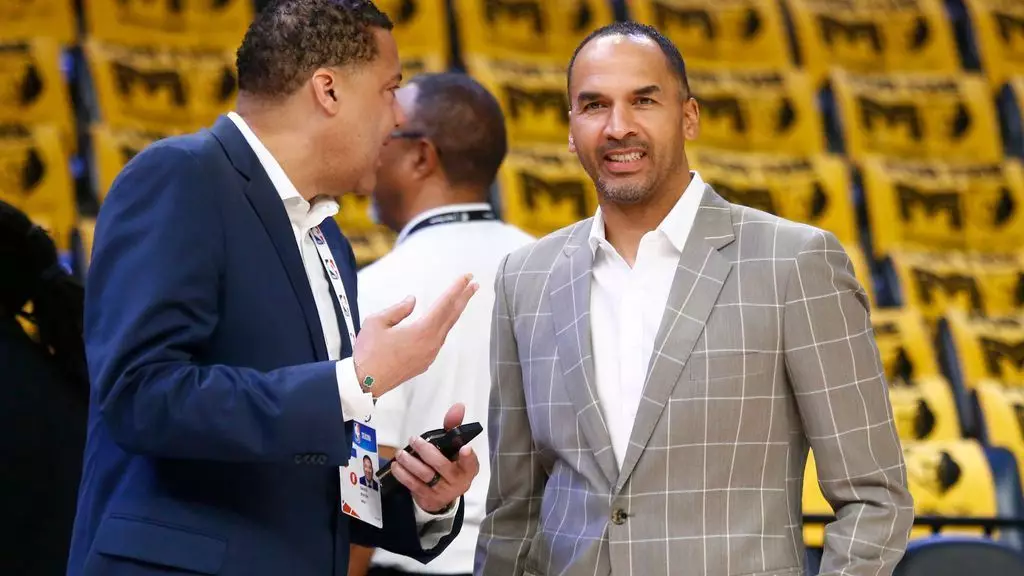In a bold, albeit controversial move, Dallas Mavericks’ general manager, Nico Harrison, traded beloved superstar Luka Doncic to the Los Angeles Lakers, acquiring veteran powerhouse Anthony Davis in return. This decision sent shockwaves throughout the Mavericks’ fan base, revealing a poignant underestimation of Doncic’s magnetic connection with the Dallas supporters. Harrison voiced his regrets during the season-ending press conference, confessing that he misjudged how deeply the fans cherished Doncic. The outcry for Harrison’s dismissal since the trade highlights a critical disconnect between management decisions and fan sentiment—one that could serve as a case study for sports franchises across the league.
Harrison’s anticipation of backlash was understandable, but the intensity of fan outrage suggests a broader issue: the emotional investment of supporters in their team’s marquee players. This dimension transcends the analytics and business acumen typically associated with front office decisions. The Mavericks were confronted with a perilous balancing act between immediate gains and long-term loyalty, sparking a debate on the ethical responsibilities of sports executives.
Missing the Mark on Building a Championship Contender
Harrison firmly holds the belief that acquiring Anthony Davis would catalyze championship aspirations for the Mavericks. Still, the unfortunate circumstances that unfolded post-trade dealt a severe blow to this vision. Ambitious plans to assemble a synergistic team, including stars like Kyrie Irving and Klay Thompson alongside Davis, fell apart due to injuries and lack of on-court chemistry. While Harrison maintained faith in the team’s potential, relying on “what could have been” only compounds the disappointment for fans yearning for immediate gratification.
The reality is stark; the Mavericks faced immense challenges even reaching the playoffs, culminating in a mediocre finish. Fans and critics alike have taken note of this slip, scrutinizing the efficacy of front office strategies. Does talent alone guarantee success? Or does it take time for superstars to meld into a cohesive unit? In a league defined by grit and resilience, Harrison’s confidence in the newly minted roster needs empirical validation on the court—something that hasn’t manifested adequately.
Injury Woes: The Achilles’ Heel
Indeed, injuries have emerged as the Mavericks’ Achilles’ heel, significantly undermining their aspirations. The injuries to Davis and Irving put the team’s dynamic in a state of flux, obscuring any potential for fluid teamwork as they struggled with player availability. Harrison, with an almost diagnostic approach, acknowledged the impact of injuries on the team’s performance, vowing that health will be paramount for next season’s success. However, this intention to return to form cannot overshadow the need for a more sustainable strategy—one that mitigates the high risk associated with a roster riddled with injury-prone stars.
Harrison’s assertion that the Mavericks have a “championship-caliber” roster when healthy is a sentiment shared by many. However, it needs to resonate through practice, chemistry, and resilience throughout a rugged NBA season. Merely boasting about talent offers no comfort to a fan base eager for tangible results. The Mavericks cannot afford to overlook the unique challenge posed by chemistry and injuries while moving forward.
Draft Prospects: A New Generation of Mavericks
As the Mavericks prepare to approach the draft season, the focus shifts to younger talent. Harrison touched upon the importance of the upcoming draft pick, potentially the 11th selection, suggesting that it could yield a future star or pivotal player. This highlights a pressing need for the Mavericks to reflect on their current roster. Having had a taste of heartbreak, now is an opportune moment to assimilate promising talent that aligns with their vision for resilience and adaptability.
The integration of young blood could catalyze the Mavericks’ metamorphosis. They require fresh legs and minds to heighten their competitiveness in a lot more fiercely contested conference. The draft cannot be a simple box to check off; it needs to be a carefully cultivated strategy aimed at achieving a long-term vision, rather than simply papering over cracks with established but injury-prone stars.
Ultimately, the Mavericks face a pivotal crossroads. With a charged fan base yearning for success and an ambitious management team attempting to orchestrate a turnaround, the balance between bold moves and maintaining relational equity with loyal supporters will be crucial. The next steps taken by the Mavericks—through draft selections, free agency efforts, and strategizing team health—could define their immediate future and fan relations as they strive for relevance in the postseason picture again.

